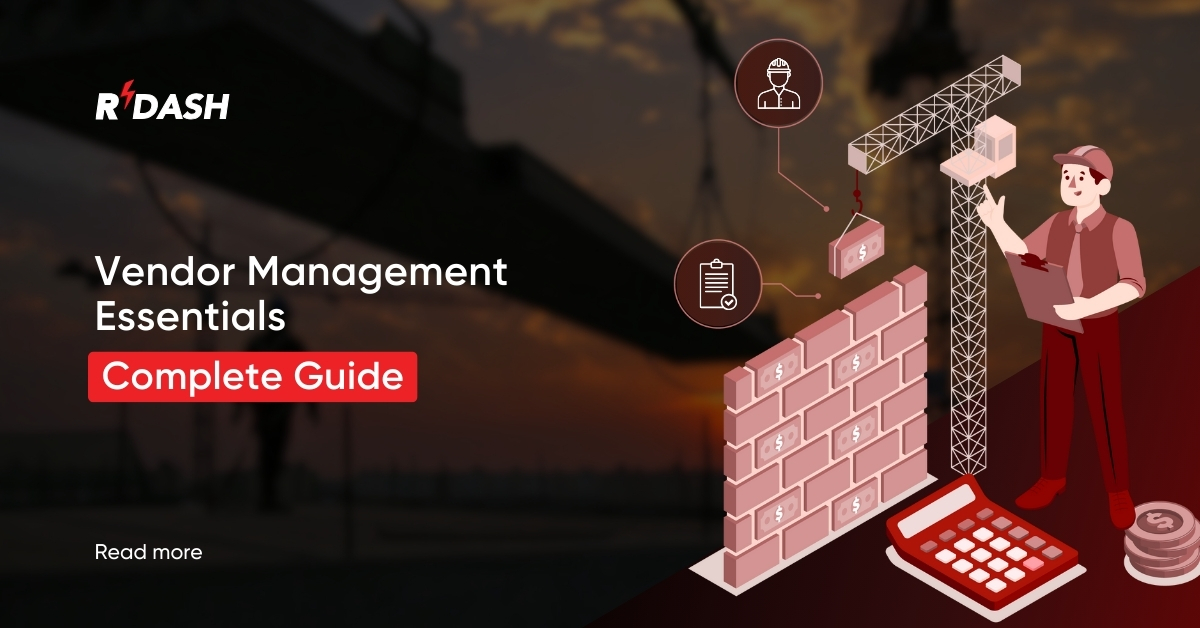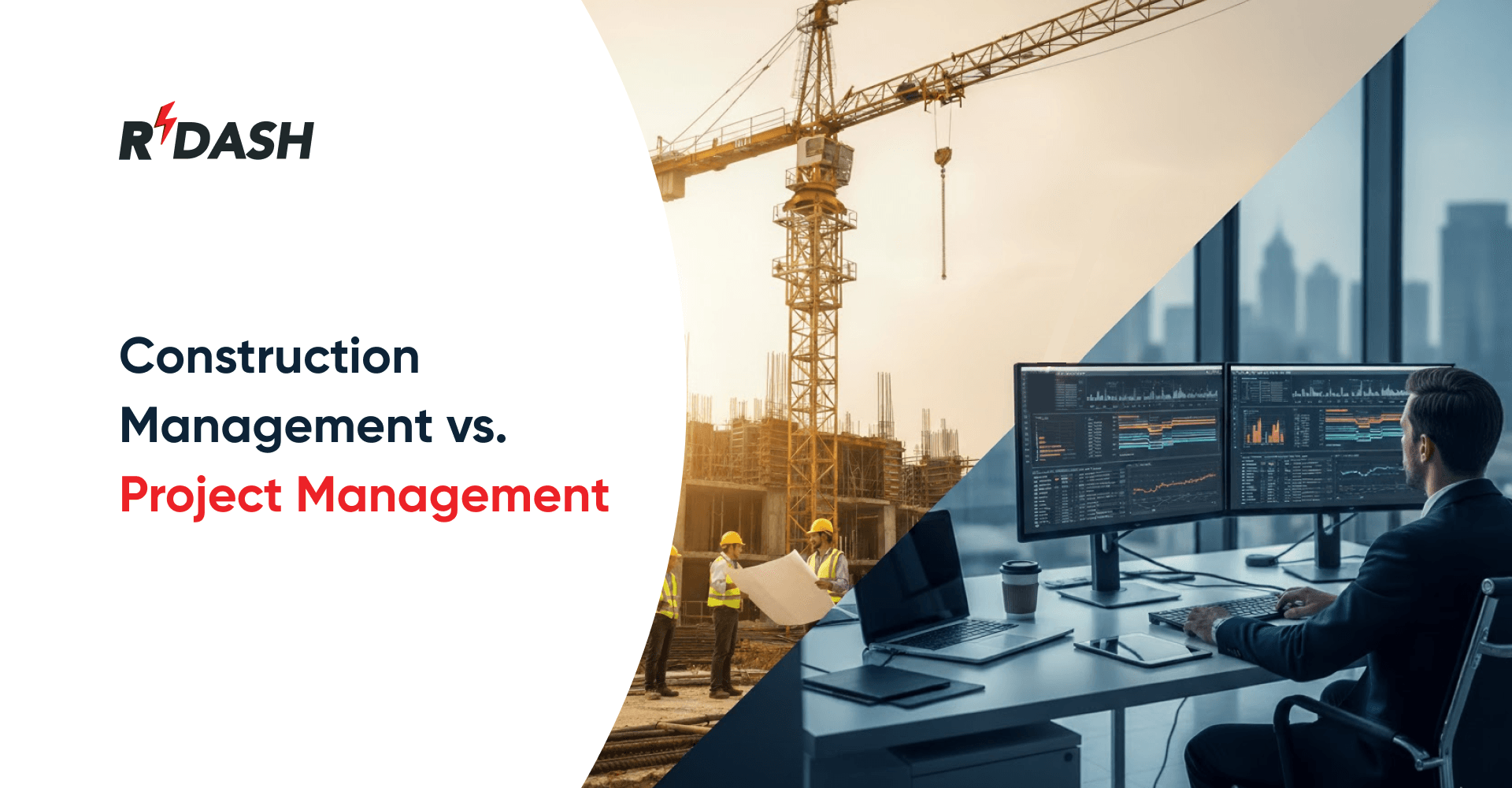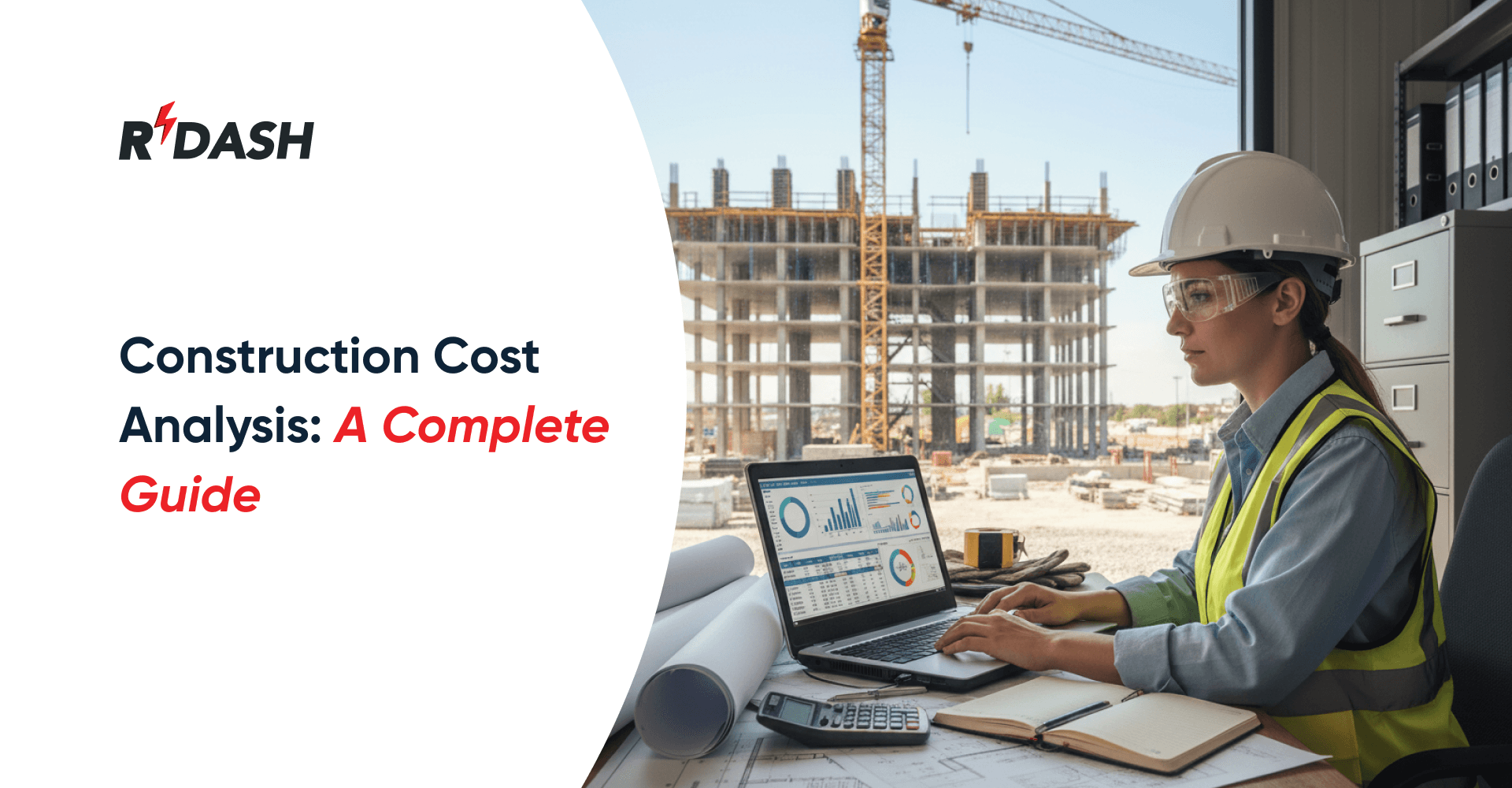What is construction vendor management ?
Vendor management in construction refers to the process of overseeing and coordinating all aspects related to third-party suppliers who provide goods and services necessary for a construction project. This includes sourcing the right vendors, negotiating contracts, ensuring timely deliveries, and managing relationships. Effective vendor management ensures that the materials, equipment, and subcontracting services are of high quality, cost-effective, and delivered on schedule, which is crucial to keeping a construction project on track and within budget.
Vendor management features
Vendor management in the construction industry incorporates important elements that optimize procedures and improve project results:
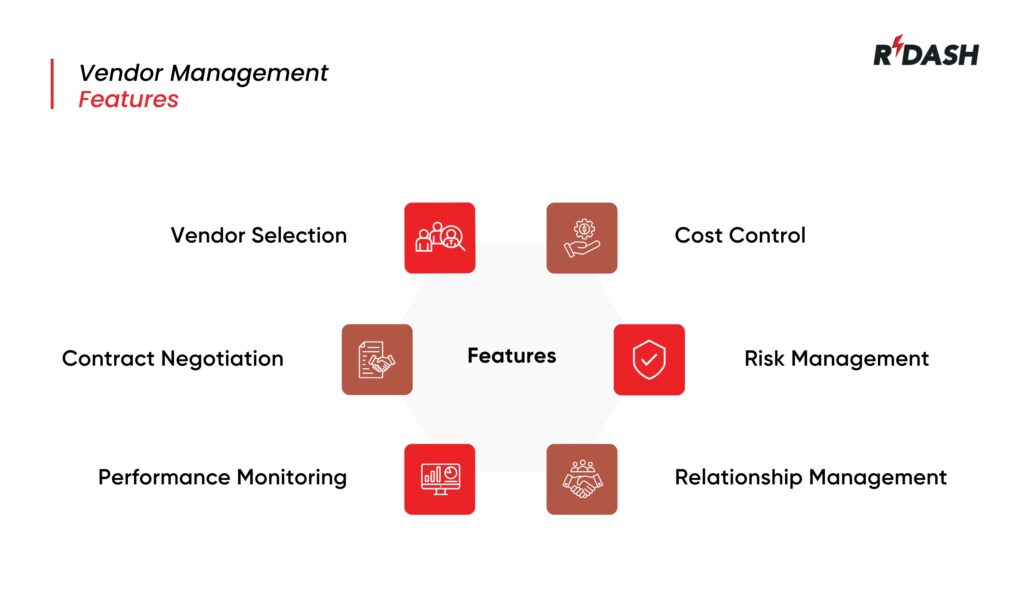
Vendor Selection: Identifying and choosing vendors that meet the project’s requirements in terms of capability, price, reliability, and service quality.
Contract Negotiation: Crafting agreements that reflect the interests of both parties, ensuring clear communication of expectations, terms, and conditions.
Performance Monitoring: Regularly assessing vendor performance to ensure compliance with contract terms, and evaluating the quality and timeliness of goods and services provided.
Relationship Management: Building and maintaining strong relationships with vendors through effective communication and problem-solving strategies. This can lead to better pricing, improved service, and priority status in tight markets.
Risk Management: Identifying potential risks associated with relying on third-party vendors and developing strategies to mitigate these risks, such as diversifying supplier bases or establishing contingency plans.
Cost Control: Using vendor management to negotiate better prices and terms, thereby controlling costs and improving the project’s overall financial performance.
How to effectively manage vendors?
Effective vendor management is critical for ensuring that a construction project runs smoothly. Here are some strategies to manage vendors effectively:
Develop Clear Criteria for Selection: Start by defining what criteria are most important for your project. This might include price, delivery capabilities, past performance, or the ability to provide after-sales support.
Establish Strong Communication: Regular and clear communication helps prevent misunderstandings and ensures that vendors are aware of your expectations. This also includes providing feedback on their performance and discussing any adjustments needed.
Implement a Formal Procurement Process: Use a standardized procurement process that includes request for proposals (RFPs), thorough evaluation methods, and transparent selection processes. This helps in making informed decisions and provides documentation in case disputes arise.
Monitor and Evaluate Performance: Set up key performance indicators (KPIs) and regular review points to assess vendor performance. This could involve regular site visits, quality checks, and performance review meetings.
Foster Good Relationships: Building a positive relationship with vendors can lead to better service and reliability. Treat vendors as partners, not just suppliers, and invest in maintaining good relationships.
Utilize Technology: Leverage technology solutions like vendor management systems (VMS) that can help track vendor performance, manage contracts, and automate some of the procurement processes. These tools can save time and reduce errors in managing multiple vendors.
Train Your Team: Ensure that all team members involved in procurement and vendor management are trained and aware of the processes and strategies in place. This consistency helps in handling vendors uniformly and professionally.
Vendor Management Process in Construction
Vendor management in the construction industry is essential not just for procuring supplies but for managing all aspects related to the relationships with firms that provide goods and services critical to a project. This methodical approach guarantees that projects are completed according to schedule, within financial constraints, and achieve the required quality levels. Here’s a detailed look at the steps involved in the vendor management process:
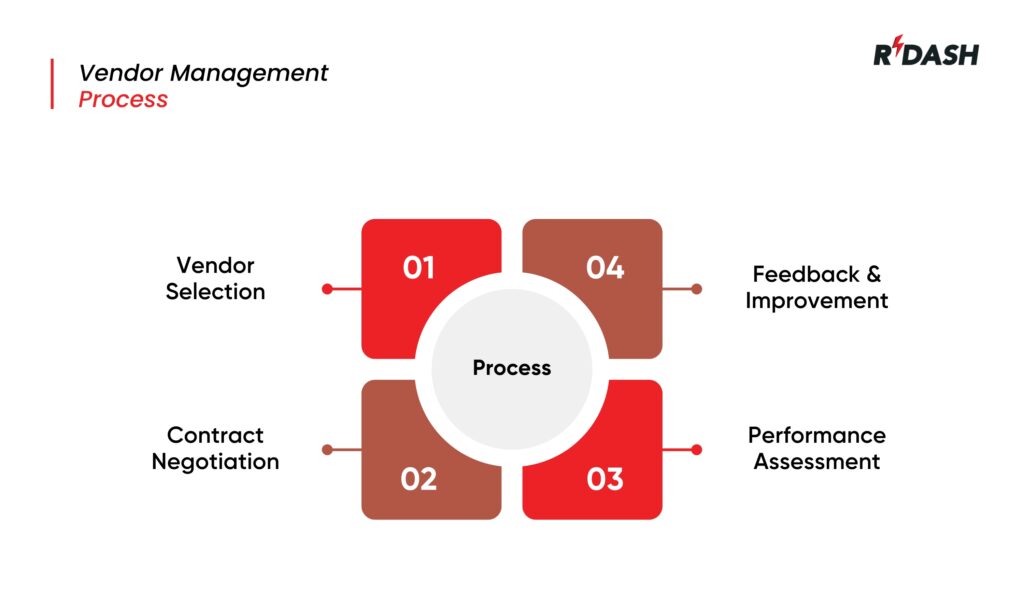
Vendor Selection
Identification: The process starts with identifying potential vendors who can meet the specific needs of the project. This involves detailed market research to create a list of potential suppliers.
Evaluation: Each vendor is evaluated based on their past performance, ability to deliver required materials or services, and financial stability. This step may involve checking references, reviewing financial documents, and analyzing past project outcomes.
Contract Negotiation
Terms and Conditions: Negotiating the terms and conditions of the contract is crucial. This includes defining the scope of work, delivery timelines, and specific responsibilities of each party.
Pricing and Quality Standards: It’s vital to negotiate pricing that fits the project budget while ensuring that quality standards are not compromised. This often involves discussions and revisions to align both parties’ expectations.
Performance Assessment
Monitoring: After finalizing the contract, continuous oversight of the vendor’s performance is crucial to verify adherence to the agreed terms. This includes regular checks on quality, timelines, and other deliverables.
Feedback and Adjustment: Providing feedback to vendors on their performance and making necessary adjustments to processes or terms is part of maintaining an effective vendor relationship.
Feedback and Improvement
Feedback Collection: Systematically gather and analyze feedback on vendor performance from project teams to assess satisfaction and identify areas for improvement.
Performance Reviews: Hold regular reviews with vendors to discuss performance and address any issues, fostering an open dialogue about expectations and experiences.
Identify Improvements: From the feedback, pinpoint opportunities for enhancing processes or relationships and develop actionable strategies to address them.
Implement Changes: Make necessary adjustments to contracts, training, or operations based on feedback and review outcomes to improve efficiency and alignment with project goals.
Continuous Monitoring: After implementing changes, continuously monitor their impact and make further adjustments as needed to ensure ongoing project success and vendor performance optimization.
Key Responsibilities in Vendor Management
Managing vendors involves several responsibilities that ensure the project’s success. One primary responsibility is overseeing contract compliance, ensuring that all terms agreed upon are met, from project start through to completion. This includes monitoring the vendor’s performance in terms of meeting deadlines, quality standards, and other contract-specific requirements.
Another significant responsibility is managing communications with vendors. This involves regular interactions to discuss project progress, resolve issues, and make necessary adjustments to the plan. Effective communication helps in building strong relationships, which can lead to better pricing, improved service, and preferential treatment in future projects.
Additionally, vendor managers must handle the financial aspects, such as processing payments according to contract terms, managing disputes, and negotiating contract changes when necessary. Ensuring financial diligence prevents overpayments and helps in maintaining a healthy cash flow throughout the project duration.
Role of vendor managers in managing vendors
Vendor managers play a critical role in ensuring the smooth execution of the vendor management process. Their primary role is to act as the bridge between their company and external suppliers. They coordinate all activities ranging from procurement to delivery, making sure that every step aligns with the project’s goals.
Vendor managers also assess vendor capabilities and develop sourcing strategies that optimize cost and efficiency. They are involved in strategic decision-making, often working to identify opportunities for cost savings or process improvements. In essence, they ensure the organization gets the maximum value from its partnerships with suppliers.
In conflict or dispute situations, vendor managers are the negotiators who resolve issues that may arise between the contracting parties. Their ability to handle conflicts effectively can save the company significant amounts of time and money while preserving important business relationships.
Moreover, they are responsible for maintaining a comprehensive vendor database, keeping track of performance metrics, and conducting regular reviews and audits. This ongoing evaluation helps in making informed decisions about contract renewals, vendor replacements, or the initiation of bidding processes for new needs.
In conclusion, effective vendor management is pivotal in the construction industry, where the timely supply of quality materials directly impacts project success. Vendor managers, by effectively handling the diverse responsibilities of vendor selection, contract management, and relationship maintenance, ensure that projects meet their deadlines, stay within budget, and match expected quality standards. Their strategic role not only supports project management but also contributes to the broader business objectives of efficiency and profitability.

